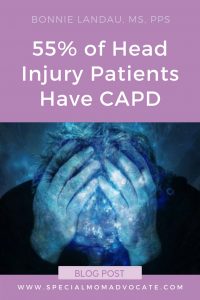 This is incredible! I just read this article in The Hearing Journal that states this statistic: 55% of patients with acquired traumatic brain injury have central auditory processing disorder. The article is written from the perspective of testing the auditory system in those with brain injury, but I am thinking the reverse should be true – those with CAPD should be tested for TBI (traumatic brain injury).
This is incredible! I just read this article in The Hearing Journal that states this statistic: 55% of patients with acquired traumatic brain injury have central auditory processing disorder. The article is written from the perspective of testing the auditory system in those with brain injury, but I am thinking the reverse should be true – those with CAPD should be tested for TBI (traumatic brain injury).
We never thought to seek out possible brain injury, and eventually found our way to get a diagnosis of CAPD. The audiologist and all assessors knew Michael had bad falls as a child, but nobody suggested we have him checked for a TBI (traumatic brain injury).
There is no agreement in the medical world as to what auditory processing disorder really is, and there is definitely no consensus as to what causes it. But anecdotal research is showing there there seems to be 2 types: genetic and acquired.
In genetic APD there are usually other members of the family with the same symptoms. They usually don’t have a history of brain trauma, or anything that might have caused the APD to appear. Therapies may help genetic APD a bit, but mostly the person needs to learn coping mechanisms to deal with it.
In the acquired type there is generally no history of APD in the family, and the individual is the only person with APD symptoms. There is often a history of ear infections, falls, high fevers, reactions to vaccines, or something traumatic that could effect the brain. This was the case with Michael. He actually had all 3 causes — ear infections, bad falls and high fevers. We’ll never know which was the primary cause, or if it was a combination, but the QEEG brain map definitely showed injury to the auditory processing area of the brain (as well as other areas). In acquired APD, therapies often do improve the condition, and in some cases it can even be cured.
I believe if a child has CAPD, and there is no genetic reason, a QEEG brain map or some other form of brain analysis should be done to determine if there is a TBI. While there is an off maybe a distant relative has it, if there is no immediate family history, it’s worthwhile to seek out a cause and possibly find a solution.
If you want to read the article with the statistic, here it is: Testing and treating (C)APD in head injury patients
ABOUT THE AUTHOR:
Bonnie Landau is a professional counselor and holistic therapist in Ventura County, California. Her specialities include therapy for autism, therapy for ADHD, and therapy for parenting who have kids with autism or ADHD or other neurodivergence. She changed careers from graphic design to counseling with the goal of helping struggling parents of kids with ADHD, autism, or other neurodivergence find strategies and solutions to help their children succeed. Bonnie is also the author of Special Ed Mom Survival Guide: How to Prevail in the Special Education Process and Find Life-long Strategies for You and Your Child.


